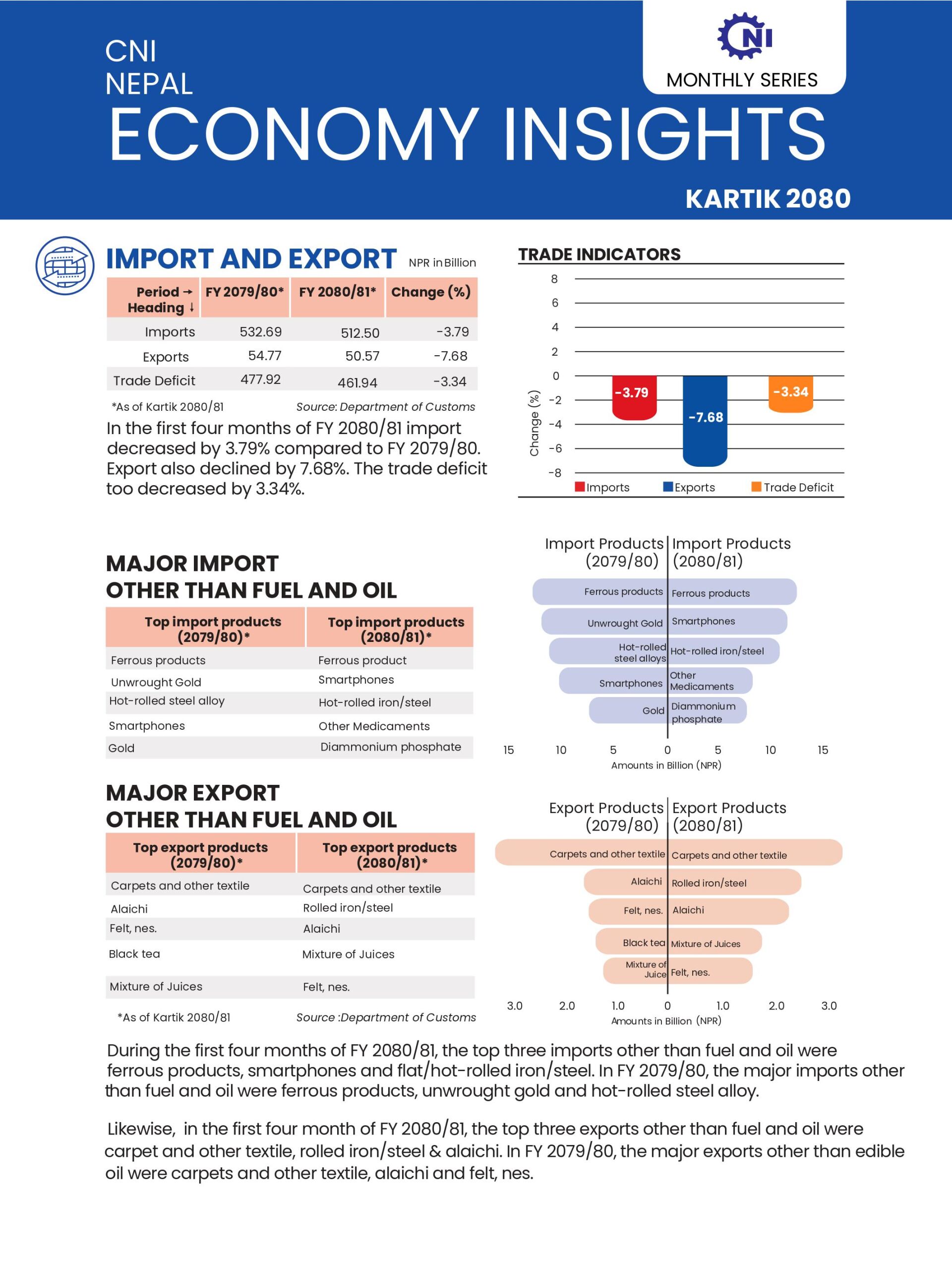
About CNI



CNI’s origin was based on the widespread belief that the industrial community of Nepal urgently needed an effective representative body that would serve as a true platform to address many issues plaguing the Nepalese industries. There was need for a modern professional body with well-trained and experienced professional staff that would be fully supported by the latest technological advancements. In addition, it had to be well connected with suitable regional and global organizations such as the World Economic Forum and other international Chambers. This body would thus be capable of not only providing useful policy inputs to the government but also ensuring the implementation of the same.
This organization focuses on the businesses which are the substantial sectoral leaders of today’s economy. These would include businesses from all sectors (with local or foreign investments) and would be all-encompassing in terms of geography as well as the nature of the business, be it manufacturing, tourism, financial services, exports, infrastructure, health or education. After much speculation in the country’s business community, the apex body of Nepalese industrialists, the Confederation of Nepalese Industries (CNI), was established by the captains of Nepal’s Industrial and corporate sector on April 17, 2002.
Since its establishment, CNI has been raising issues like the persistent economic situation imbroglio, need for reforms in financial sector, strengthening of private sector's capabilities, the streamlining of private sector's initiation on development agenda, double digit growth issues and industrialization based on trade competitiveness. It is an organization that works in coordination with other organizations and is increasingly becoming involved in areas where the existing system has failed to deliver. The organization is working along the lines of several organizations in various developing countries such as India, Thailand, Malaysia, etc. and hopes to hire expertise as well as bilateral support in development of the Confederation, the theme of which is, “Talking Business, Talking Change”.
Vision
To play a lead role in making the country's industrial sector vibrant, resilient as well as globally competitive and to promote an investment-friendly environment to achieve a sustainable double-digit economic growth.
Mission
The primary working area of CNI includes encouraging positive competition and competent management among the industries, promoting domestic and foreign investment and creating employment opportunities in the country's industrial and corporate sectors.
Values
To provide meaningful policy inputs to the government in the area of industrial development, investment and export promotion, trade facilitation, industrial relation being a "Think Tank" of country's economic and industrial sector.
Objectives and Goals
The principal objective of CNI is to encourage positive
competition and competent management among the
industries while promoting domestic and foreign
investment and creating employment opportunities in
the country’s industrial and corporate sectors.
Apart from this, CNI has identified the following
specific goals and is working towards achieving the
same:
- To represent the country’s manufacturing and
services industries.
- To provide meaningful policy inputs to the
government in the area of industrial development,
investment and export promotion, trade
facilitation, industrial relations, etc.
- To act as a forerunner of major changes in the
global economic and business scenarios and
possible impacts on Nepal.
- To help in creating an industrial environment
conducive to domestic and foreign investment.
- To work closely with the government on policy
formulation and implementation issues.
- To enhance the efficiency and competitiveness of
Nepalese industries.
- To create opportunities for the country’s industrial
growth through specialized services and global
linkages.
-To act as a platform of consensus building and
networking for Public-Private Partnership in
development agendas.
- To develop CNI as a ‘Think Tank’ institution
for the management and development of the
economic and industrial sectors of Nepal through
research and development.
CNI Policies
Economic reforms in the country started in the mid 1980s. The reforms were intensified and augmented in
the early 1990s after the restoration of democracy in
1990. Since the early nineties, Nepal has implemented
extensive legal and policy reforms to facilitate its
integration with the global economy. Like many other
developing countries, Nepal also pursued an inward looking and state-led development strategy.
However, the impact of these reforms on trade,
economic growth and foreign direct investment (FDI)
needs to be strengthened. Political instability, lower
literacy rate, under-utilization of available resources,
geographical difficulty, etc. are some of the reasons
behind Nepal being unable to attract a large number
of investors. Unlike other years, this year the Covid 19
pandemic has largely hampered domestic as well as
foreign investment performance.
Despite these challenges, CNI believes that Nepal can
build the economy through its privileged geographical
access to two economic giants as its neighboring
countries with huge markets, young population,
flourishing local entrepreneurial culture and expanded
networking and economic diplomacy at national and
international levels. With abundant natural resources,
Nepal has the potential to attract investment from
domestic and foreign investors. Towards this advanced
reform in existing policies as well as incentives and
reforms for industries of Nepal must be prioritized.
With this view, CNI aims to work with the government
and development partners to improve the investment
climate, investment performance and industrial
development. In order to achieve the goal of double digit economic growth, CNI adheres to the following
policies while performing its activities:
- Foreign Direct Investment is one of the important
engines for economic development. However,
there is tough competition to attract FDI. CNI, in
association with the Government of Nepal, will
make an effort to change the mindset of foreign
investors from ‘Why Nepal’ to ‘Why Not Nepal’.
- Infrastructure is crucial for investment promotion
and industrial development of a country. To
develop infrastructure at a faster pace, besides
peace and security, CNI will help the Government
of Nepal to bring favorable investment policies so
that private investment and FDI can be attracted
into infrastructure projects.
- Productivity, the most crucial variable for dynamic
economic growth and employment creation,
is low because the government is not oriented
towards productivity enhancement; rather they
are focused on cheap labor. CNI will function to
enhance industrial relations; increased investment
in human resources; paying living wages;
introduction of modern technology, and a strategic
vision, based on consensus and making stringent
labor laws to increase the labor productivity.
- As leaders of the private sector, CNI will focus on
increasing productivity through skill development
and technology adaptation programs for national
economic growth and risk management in the
unfolding era of uncertainty, crisis and conflict.
- The cost of transaction and cost of funds should
be reduced with utmost urgency to uplift the
competitiveness of the Nepalese economy and to
ameliorate the investment climate. In this respect,
CNI is very sincere and ready to work with the
government as well as Nepal Rastra Bank (NRB),
the central bank of Nepal, on issues of financial
sector reform and capital market development,
which in turn will be instrumental in enhancing
financial deepening and reducing the cost of
capital.
Become a CNI Member
Create a "Prosperous Nepal", wherein this prosperity reaches across the country to all our fellow citizens.

